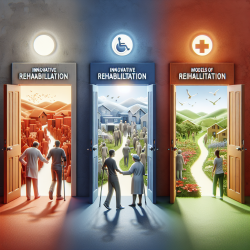Introduction
In the evolving landscape of healthcare, the implementation of innovative models of care is essential for improving patient outcomes. A recent study, "Implementation of a novel rehabilitation model of care across Alberta, Canada: a focused ethnography," offers valuable insights into the experiences of early adopters of a new Rehabilitation Model of Care (RMoC). This blog will explore how practitioners can enhance their skills by integrating the findings of this research into their practice.
Understanding the RMoC Implementation
The RMoC was introduced to foster patient-centered, standardized, and data-driven care. The study highlights the experiences of early adopters who navigated the complexities of implementing this model. Key challenges included emotional responses to change, data access delays, and communication barriers. However, teams that embraced the model reported improved patient outcomes and system efficiencies.
Key Takeaways for Practitioners
Practitioners looking to implement innovative care models can learn from the experiences of these early adopters. Here are some actionable insights:
- Embrace Change: Understand that change can evoke strong emotions. Developing a shared language and coping strategies can help teams navigate these feelings.
- Effective Communication: Clear and consistent communication is vital. Teams that communicated effectively were more successful in implementing the RMoC.
- Data Utilization: Access to timely and relevant data is crucial. Practitioners should advocate for efficient data collection and utilization processes.
- Supportive Leadership: Leadership plays a critical role in facilitating change. Leaders should provide support and resources to help teams overcome challenges.
- Continuous Learning: In-person training and mentorship opportunities are valuable. Practitioners should seek out and participate in these opportunities to enhance their skills.
Encouraging Further Research
While the study provides valuable insights, it also highlights the need for further research in developing, implementing, and evaluating models of care. Practitioners are encouraged to engage in research activities to contribute to the growing body of knowledge in this area.
Conclusion
The implementation of innovative models of care, such as the RMoC, offers significant potential for improving patient outcomes. By embracing change, fostering effective communication, utilizing data, and engaging in continuous learning, practitioners can enhance their skills and contribute to the success of these models. For those interested in delving deeper into the research, I highly recommend reading the original study.
To read the original research paper, please follow this link: Implementation of a novel rehabilitation model of care across Alberta, Canada: a focused ethnography.










